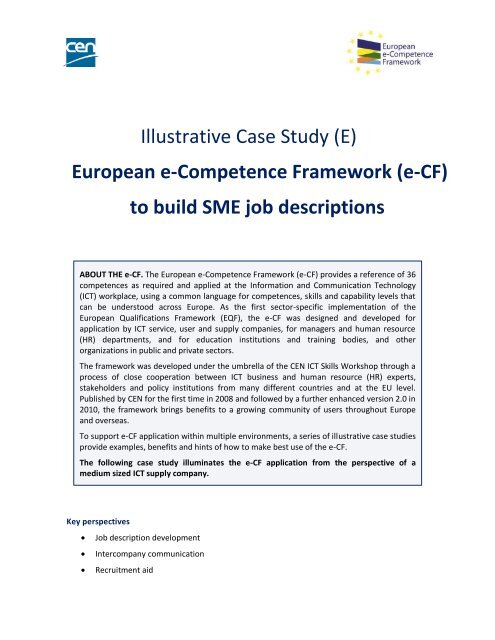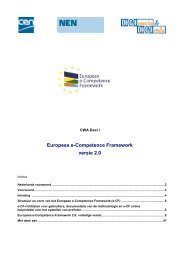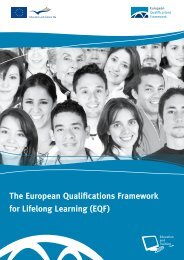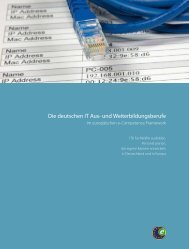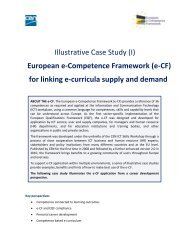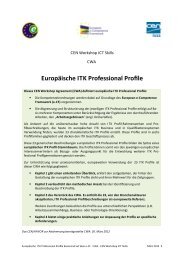download - European e-Competence Framework
download - European e-Competence Framework
download - European e-Competence Framework
You also want an ePaper? Increase the reach of your titles
YUMPU automatically turns print PDFs into web optimized ePapers that Google loves.
Illustrative Case Study (E)<br />
<strong>European</strong> e-<strong>Competence</strong> <strong>Framework</strong> (e-CF)<br />
to build SME job descriptions<br />
ABOUT THE e-CF. The <strong>European</strong> e-<strong>Competence</strong> <strong>Framework</strong> (e-CF) provides a reference of 36<br />
competences as required and applied at the Information and Communication Technology<br />
(ICT) workplace, using a common language for competences, skills and capability levels that<br />
can be understood across Europe. As the first sector-specific implementation of the<br />
<strong>European</strong> Qualifications <strong>Framework</strong> (EQF), the e-CF was designed and developed for<br />
application by ICT service, user and supply companies, for managers and human resource<br />
(HR) departments, and for education institutions and training bodies, and other<br />
organizations in public and private sectors.<br />
The framework was developed under the umbrella of the CEN ICT Skills Workshop through a<br />
process of close cooperation between ICT business and human resource (HR) experts,<br />
stakeholders and policy institutions from many different countries and at the EU level.<br />
Published by CEN for the first time in 2008 and followed by a further enhanced version 2.0 in<br />
2010, the framework brings benefits to a growing community of users throughout Europe<br />
and overseas.<br />
To support e-CF application within multiple environments, a series of illustrative case studies<br />
provide examples, benefits and hints of how to make best use of the e-CF.<br />
The following case study illuminates the e-CF application from the perspective of a<br />
medium sized ICT supply company.<br />
Key perspectives<br />
Job description development<br />
Intercompany communication<br />
Recruitment aid
e-CF TO BUILD SME JOB DESCRIPTIONS PAGE 2 / 4<br />
Summary<br />
A German medium sized enterprise (approx. 300 employees at headquarters) provides enterprises<br />
solutions for administration and operation of complete ICT-infrastructures. It has used the e-CF for<br />
re-structuring and harmonization of internal job descriptions, articulating competencies in a<br />
common and understandable way. This work has also supported recruitment requirements and<br />
aided better descriptions for service offerings. The end result was that all participants were very<br />
comfortable with the outcomes and with the enhancement of collaboration between ICT and HR.<br />
e-CF Value<br />
The e-CF provided the engine to describe requirements and competences in a consistent and<br />
commonly understandable way. The framework facilitated communication and collaboration<br />
between the internal functions of HR and ICT operations. Prior to using the e-CF staff from ICT and<br />
HR talked at cross-purposes, typically ICT people spoke about special technical issues and HR people<br />
about training issues. Deploying the e-CF ICT executives and HR representatives collectively<br />
described;<br />
<br />
<br />
Requirements of existing and future workplaces and work processes<br />
Existing and needed competences.<br />
Challenges encountered<br />
ICT executives and HR representatives, within the company, in principle, pursued one common<br />
objective: to support the growth of the enterprise. Furthermore, they were familiar with each other<br />
and motivated to work together. However when in engaging in dialogue they had many differences<br />
of opinion. It became clear that the reason was owing to a lack of understanding of basic<br />
terminology of the e-CF.<br />
Using the following definitions, collaboration and mutual understanding was restored.<br />
<strong>Competence</strong> is ability [German meaning: “Können” is broader than “Fähigkeit”]<br />
<strong>Competence</strong>s include knowledge, skills, also soft skills, and attitudes<br />
<strong>Competence</strong>s are not the same as performance or requirements<br />
Soft skills are integrated in competence and level descriptions, the e-CF doesn't differ<br />
competences in the popular categories “functional”, “methodical”, “social” and “individual”<br />
<strong>Competence</strong> development is more than education or qualification. <strong>Competence</strong> cannot be<br />
determined by examination alone; the best confirmation of competence is to do, to<br />
document and to consider real work at different levels of complexity<br />
Benefits highlighted<br />
The main aim of the German enterprise was to harmonize internal job descriptions for better<br />
support to enterprise growth. For this purpose, it was necessary to describe requirements and<br />
competences in a common and understandable way. The e-CF was used to make collaboration<br />
between ICT and HR department easier, and optionally, an external e-CF expert was deployed to<br />
support this aim.<br />
e-CF CASE STUDY – E CEN ICT SKILLS WORKSHOP www.ecompetences.eu www.cen.eu
e-CF TO BUILD SME JOB DESCRIPTIONS PAGE 3 / 4<br />
The method adopted<br />
A series of workshops were held between HR and the ICT operations teams, facilitated by an e-CF<br />
expert. The implementation steps were as follows;<br />
1. The collaborative team re-structured and harmonized the internal job descriptions.<br />
2. In a further step new job descriptions were related to qualifications (from the German<br />
Advanced IT Training System – AITTS) or Training Options (ITIL, network administration<br />
etc.). Using the e-CF the ICT executives expressed their requirements in a way, that the<br />
HR department were able to recruit people with suitable qualifications and improve<br />
internal competence development.<br />
The most important paper used in this workshop was the e-CF overview scheme. This scheme<br />
provides an outline of the technical basis and the process structure of the e-CF. See Table 1 below.<br />
e-CF CASE STUDY – E CEN ICT SKILLS WORKSHOP www.ecompetences.eu www.cen.eu
e-CF TO BUILD SME JOB DESCRIPTIONS PAGE 4 / 4<br />
The schematic acted as a catalyst for mutual understanding between HR and ICT functions by use of<br />
a common language enabling agreements on job description creation.<br />
The results were:<br />
<br />
<br />
<br />
A specific new job description expressed with e-CF competencies<br />
A generic schema for re-structuring and harmonizing all job descriptions<br />
A consolidated method enabling staff from ICT and HR to translate existing job profiles and<br />
to describe new jobs by using the e-CF competencies and levels in a common and<br />
understandable way<br />
Expansion to other examples<br />
The above case illustrates how the e-CF has been used for enhancing communication between HR<br />
and ICT for harmonizing job descriptions and more targeted recruitment. The e-CF can also support<br />
communication of ICT supply competence to customers or for internal profile structuring and<br />
assessment.<br />
References<br />
<br />
<br />
<br />
Further information can be found by accessing the user guide at the home page of the e-CF<br />
website. http://www.ecompetences.eu/1386,Home.html<br />
Also see CEN Workshop Agreement (CWA) 16367: „e-CF into SME’s“<br />
http://www.cen.eu/cen/Sectors/Sectors/ISSS/CWA<strong>download</strong>/Pages/ICT-Skills.aspx<br />
A simple online tool for building profiles can be accessed at<br />
http://profiletool.ecompetences.eu/<br />
e-CF CASE STUDY – E CEN ICT SKILLS WORKSHOP www.ecompetences.eu www.cen.eu


